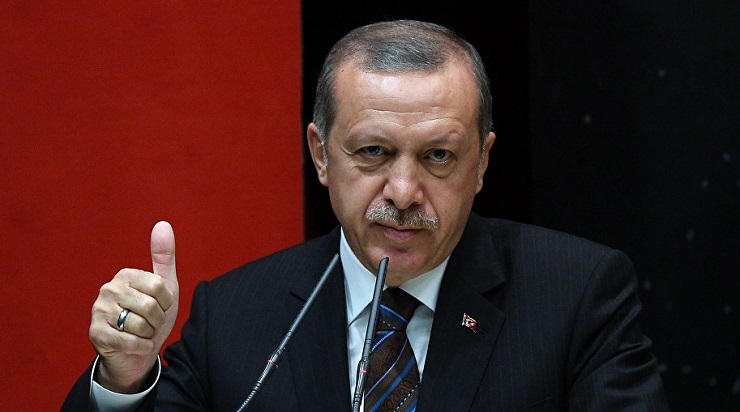According to estimates of Turkish and foreign analysts, the foreign policy situation in Turkey this year promises to be difficult, not only because of the new hypothetical challenges possed by the new US President Joe Biden to the Turkish leadership, but also the legacy of previous problems in the Eastern Mediterranean, in Libya and in relations with the EU.
In November 2020, Turkish Foreign Minister Mevlut Cavusoglu, speaking before the parliamentary commission on the budget, outlined the main principles and directions of the country’s “active foreign policy” in 2021. Among the main priorities of the minister, in addition to traditional areas (the West, Russia, the Middle East and the Mediterranean region as a whole), he named support for the Turks – Ahiska (that is, all ethnic Turks living in the former Soviet Union), and acknowledged the particular importance of the “Turkic” direction for Ankara today.
As the reader may know, a significant place in this “Turkic” direction has been occupied in recent years by the idea of creating the “Army of Turan,” which Ankara is trying to give quite tangible features. At the end of the previous year, the Turkish leader, obsessed with the ideas of neo-Ottomanism, saw as part of such a military bloc primarily Azerbaijan, Kazakhstan, Uzbekistan, Turkmenistan, Kyrgyzstan and Tajikistan, as well as the Turkish Republic of Northern Cyprus, not recognized by the international community, under the direct military and political leadership of Turkey.
In an attempt to mitigate the external backlash against such attempts to create the “Army of Turan,” Ankara, through the government-controlled media, is trying to level accusations that it wants to create some kind of significant Turkish-led army that hopes to unite all the peoples of Turan. In particular, to present everything in such a way that the modern demands of the army are supposedly completely different, and the war itself has changed, so the “Army of Turan” should be perceived only as a system of communication, contacts, information transfer and joint coordination between the armies of different national states, whose interests will be “blurred” in the name of implementing certain common tasks.
However, the recitation of the poem “Araz-Araz” by Azerbaijani poet Bakhtiyar Vahabzadeh, which is the unofficial manifesto and slogan of the carriers of the idea of unification of Turkic peoples, by Turkish President Recep Erdogan during a recent military parade in Baku, was a clear signal of the true goals of the “Army of Turan”.
In the information coverage by Ankara of the processes of unification of the Turkic peoples and the creation of the “Army of Turan”, the October tour of Turkish Defense Minister Hulusi Akar through Central Asian countries and his signing of an agreement on military-technical cooperation with Uzbekistan and Kazakhstan have recently stood out as a significant step in this direction. At the same time such propagandists were not even embarrassed by the fact that the inclusion of Kazakhstan in the “conditional Turan” contradicted the vector of Nur-Sultan, declaring his desire to be a kind of Central Asian Switzerland — a mediator in local regional conflicts.
In this regard the Ministry of Defense of Kazakhstan was even forced to officially dispel such assumptions of the Turkish media and report that no offers to the Kazakh Defense Ministry to participate in a unified army of the Turkic states were received. Such an issue is not on Kazakhstan’s international military cooperation agenda.
As for Ankara’s generally active attempts to create a military alliance with the “Army of Turan,” it is surprising that there is no embarrassment from the media pushing this idea given the fact that Turkey is a NATO member, Kyrgyzstan and Kazakhstan are bound by the CSTO treaty, and Azerbaijan is actually the leader of the Non-Aligned Movement, which includes countries that pledge not to join any military blocs.
Nevertheless, in line with Ankara’s policy of strengthening its influence, the topic of Turkey’s military alliance in the region remains very relevant. And the recent signing of the “Islamabad Declaration” by the foreign ministers of Turkey, Azerbaijan and Pakistan is a clear confirmation of this. As follows from the text, this trilateral declaration should ensure the deepening of cooperation in many areas, especially in the political, economic, peace and security spheres. The parties agreed to make joint efforts in the international and regional arena to combat Islamophobia, discrimination and oppression of Muslims, as well as to jointly defend the positions of the signatories to the declaration on the conflict issues: in Karabakh, the Cyprus problem, in the Aegean Sea and the Eastern Mediterranean, around the problem of Jammu and Kashmir.
As for the development of military ties between the countries that signed the “Islamabad Declaration”, it is interesting to note the report of the Azerbaijani media commenting on the meeting of Defense Minister of Azerbaijan, Colonel General Zakir Hasanov with the newly appointed Ambassador Extraordinary and Plenipotentiary of Pakistan Bilal Khaye, during which the sides exchanged views on cooperation in the military and military-technical fields between the three states.
While the pro-government media have expressed their full approval of the Turkish leadership, some opposition publications (Gazete Duvar and Cumhuriyet, among others) have recently become increasingly pessimistic about Erdogan’s policies and claim that in order to look to the coming year with hope, a change of government in the country is a must. Former Prime Minister and current leader of the opposition Party of the Future Ahmet Davutoğlu also spoke to the Turkish television channel Karar about the possibility of Erdogan’s political removal.
Whether or not Erdogan’s attempts to create a military alliance in the Turan area will bring any success in 2021 remains to be seen.
Vladimir Odintsov, political observer, exclusively for the online magazine “New Eastern Outlook”.

